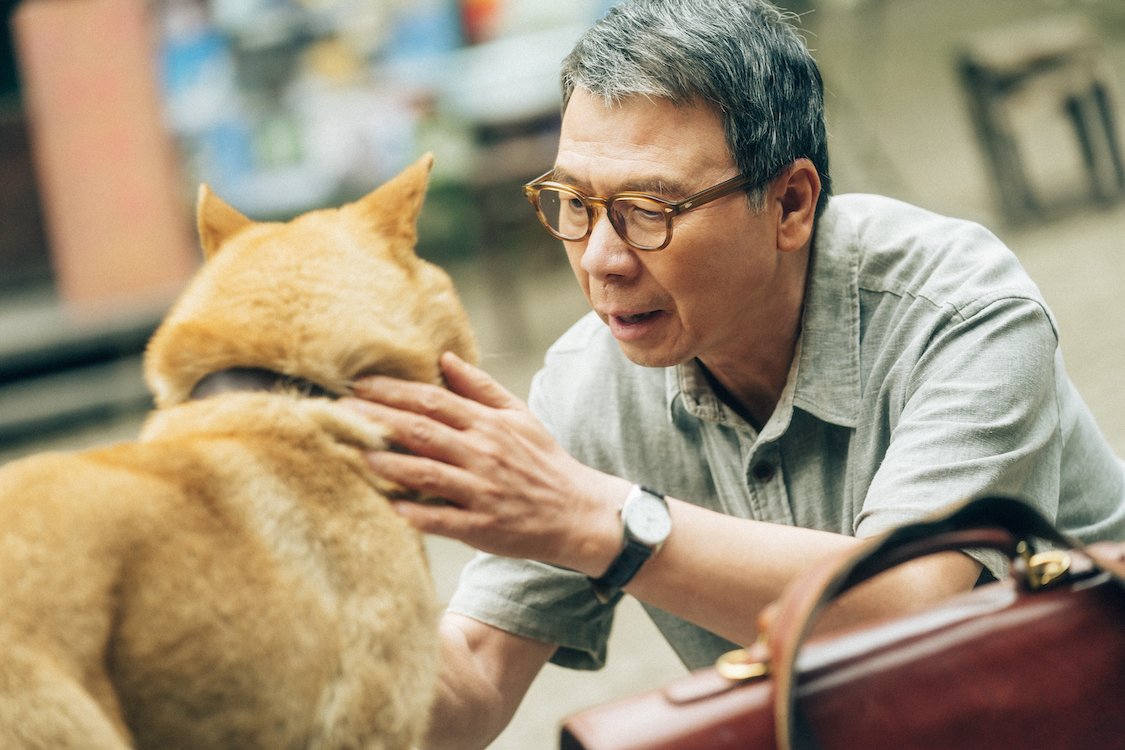Dog Star
Puppehs! The famously loyal train station dog moves from Tokyo to Chongqing in Xu Ang’s unnecessary carbon copy.
Hachiko
Director: Xu Ang • Writers: Zhang Hansi, Xu Ang, Li Liangwen, Li Lin, based on The Tale of Hachiko by Kaneto Shindo
Starring: Feng Xiaogang, Joan Chen, PAx White, Eponine Huang, Yang Bo, Xue Xuchun, Qian Bo, September, Dou, Tao, Xiong and Da Huang
China • 2hrs 5mins
Opens Hong Kong April 20 • IIA
Grade: B
The Akita that sat at Shibuya train station, waiting nine years for his human – who had died without alerting said Akita – is now the stuff of legend. This happened back in 1935, and in the eight decades since there have been countless re-tellings of what is, admittedly, an astonishing and somehow purely Japanese story. Most famously there’s Seijiro Koyama’s The Tale of Hachiko from 1987, then probably Lasse Hallström’s Americanised Hachi: A Dog’s Tale from 2009. There are manga, games, kids’ books, TV episodes, and a Telugu film (Tommy).
So here comes Xu Ang’s Hachiko | 忠犬八公, a Chinese spin on the sentimental man’s best friend epic. Actor-directors Feng Xiaogang (I Am Not Madame Bovary) plays the university professor and Joan Chen (The Last Emperor, Xiu Xiu: The Sent Down Girl) as the wife resistant to dog ownership. Is this film necessary? No. Is it bad? No. Does it imbue the material with an inherently Chinese POV? Nope. But man, the multiple dogs that play Batong (oh, look, cultural specificity!) are pretty damn cute.
Xu starts the story with Li Jiazhen (Chen) returning to Chongqing with her son, Xinqiao (PAx White) after years away, and spends the initial 15 minutes or so constructing a travelogue detailing the city’s singular culinary delights, its rich history and rapid development over the past couple of decades. Isn’t it just a marvel of bureaucratic planning? Okay, dudes, we get it. Nice town. Before long it flashes back 15 years, to when Jiazhen was a mahjong-mad shop owner and housewife, living with her emergent computer nerd son, a daughter Xiaozhou (Eponine Huang) who’s … a girl, and patriarch Chen Jingxiu (Feng), a civil geography professor. The rest we know, but if you were under a rock any time since the Great Depression, Jingxiu finds a farm puppy stranded on the side of the road on his way to work one day and takes it home, much to the chagrin of Jiazhen. Eventually the dog, named Batong, becomes part of the family, and toddles off to meet Jingxiu at the train station on his commute home. Every. Damn. Day. When Jingxiu dies suddenly, Batong continues going to the station every day for nine years until he joins the old man in the afterlife.
Animal movies, especially dog movies, are inherently manipulative. Anyone with a pet will “get” them and be charmed – or so hyperaware of the manipulation at play they’re actively loathed. But, come on! Look at them! The huskies in Eight Below were gorgeous. The funny sounding one in Haw was lovely. Puppy Batong is a killer. You kind of have to be soulless to not like a dog movie, even a little a bit. Hachiko doesn’t really bring anything to the table, and Xu and co-writers Zhang Hansi, Li Liangwen and Li Lin don’t even try to tell the story through a Chinese lens. There’s not much point to re-making such an intensely emotional movie unless you’re going to say something about the Chinese owners’ relationship to their dogs; Feng seems to have a genuinely sweet connection to the Batongs. DOP He Shan captures that distinct gauzy, sunny Japanese aesthetic and tosses in a few flashy oners to introduce Jingxiu, but Xu doesn’t bother to re-contextualise the duo – is this an idealised view of the man-dog dynamic? An indicator of changing attitudes? Part of Chongqing’s reinvention? Anything will do. Without that, it just makes Hachiko look like a Xerox no one needs.
Hachiko’s endgame is twofold. This is as polished, inoffensive and apolitical as it gets, and the top shelf subs and vector graphics in the credit roll indicate international audiences are a target. And why not, because goddammit puppies! On top of that the film’s heart is in the right place, and those slick closing credits make a point of reminding viewers to adopt, don’t shop. Hard to bitch about that. — DEK



